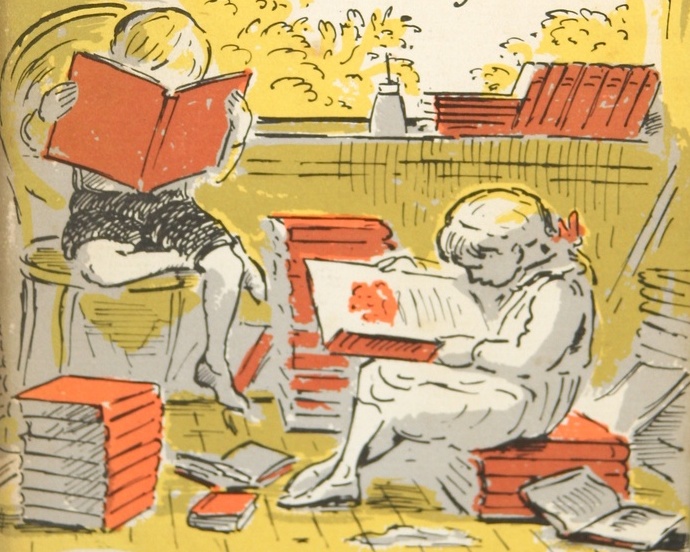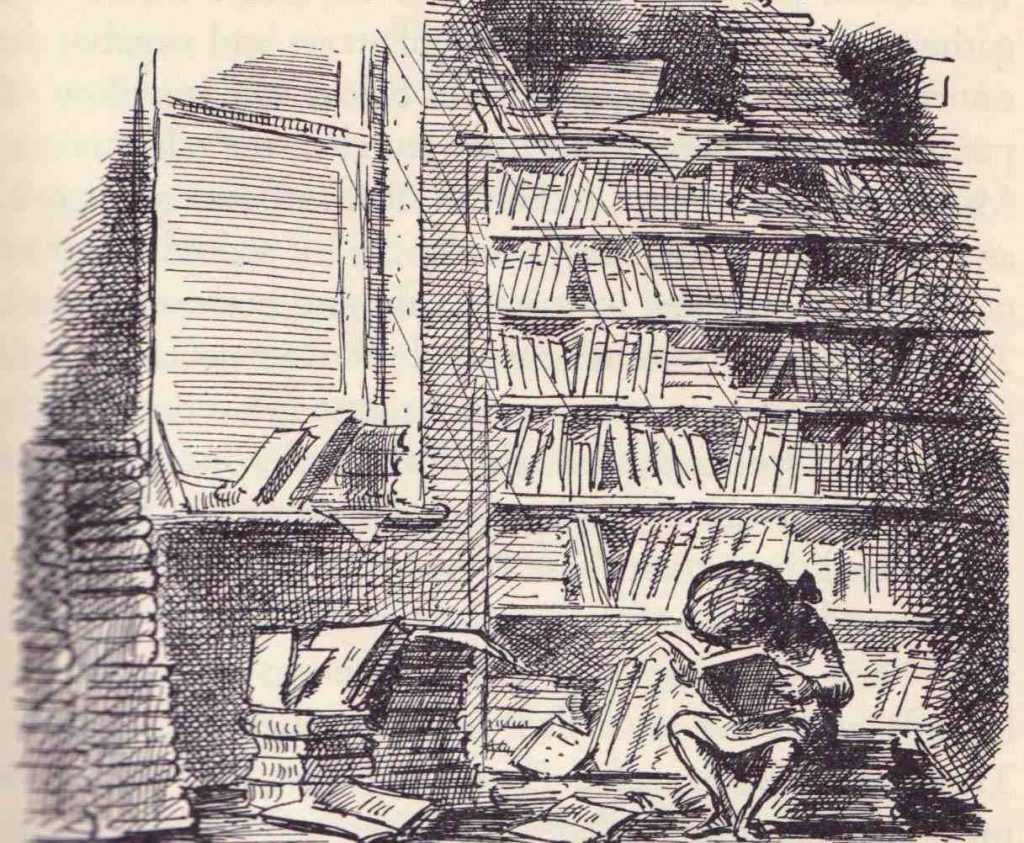
Edward Ardizzone illustration for The Little Bookroom (1955).
“That dusty bookroom, whose windows were never opened, through whose panes the summer sun struck a dingy shaft where gold specks danced and shimmered, opened magic casements for me through which I looked out on other worlds and times than those I lived in: worlds filled with poetry and prose and fact and fantasy.” –Eleanor Farjeon, forward to The Little Bookroom
Dear Friends and Readers,
January is a month for reflection. We write down resolutions–and think about new beginnings. The poet Mary Oliver expressed that renewal of spirit in her Morning Poem, where she spoke of hope over sorrow, and a future where nature and spring returns, “whether or not you have ever dared to be happy.”
If freedom annoys you, a bookstore or library must seem like a prison. Books are a conduit to learning and hope, and a path toward freedom, empathy, change and a better life. “Books are a uniquely portable magic,” said Stephen King. Try a steady diet of reading for the new year–it will be a comfort and source of renewal.
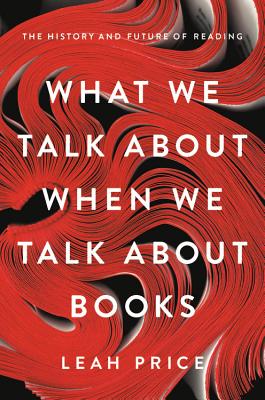 “The intelligent book makes us rethink and re-new the endlessly alive, endlessly shape-shifting, and self-reinventing activity that is reading,” wrote novelist Neel Mukherjee in a blurb for What We Talk About When We Talk About Books by Leah Price, a collection of essays about the “history and future of reading” and what this portends for us booklovers.
“The intelligent book makes us rethink and re-new the endlessly alive, endlessly shape-shifting, and self-reinventing activity that is reading,” wrote novelist Neel Mukherjee in a blurb for What We Talk About When We Talk About Books by Leah Price, a collection of essays about the “history and future of reading” and what this portends for us booklovers.
“Printed books were the first social media,” writes Price, a professor of English at Rutgers University, and expert on Victorian lit. Discussions around books were once part of serious public debate. Reading groups help continue that tradition. Price sees a lot of positive news about reading. “Show me how you want to read, and I’ll show you who you want to be,” wrote Price. Reading aloud to babies and young children is the first step in creating a tradition of lifetime readers. “No bigger bait and switch exists than what parents do when they read aloud to a baby,” writes Price. “Hook your darling on books by associating reading with snuggles…”
Price reports on books about books, researching reading habits, book trivia, librarians, and booksellers. Each chapter is named after the practice of reading and a book’s physical construction. Her deadpan humor and jaunty style makes this a joy to read. “Compared to one-on-one counseling, meanwhile, bibliotherapy looks absurdly cost-effective,” notes Price. “A book does worse than a therapist, but better than nothing” –from her chapter “Prescribed Reading.”
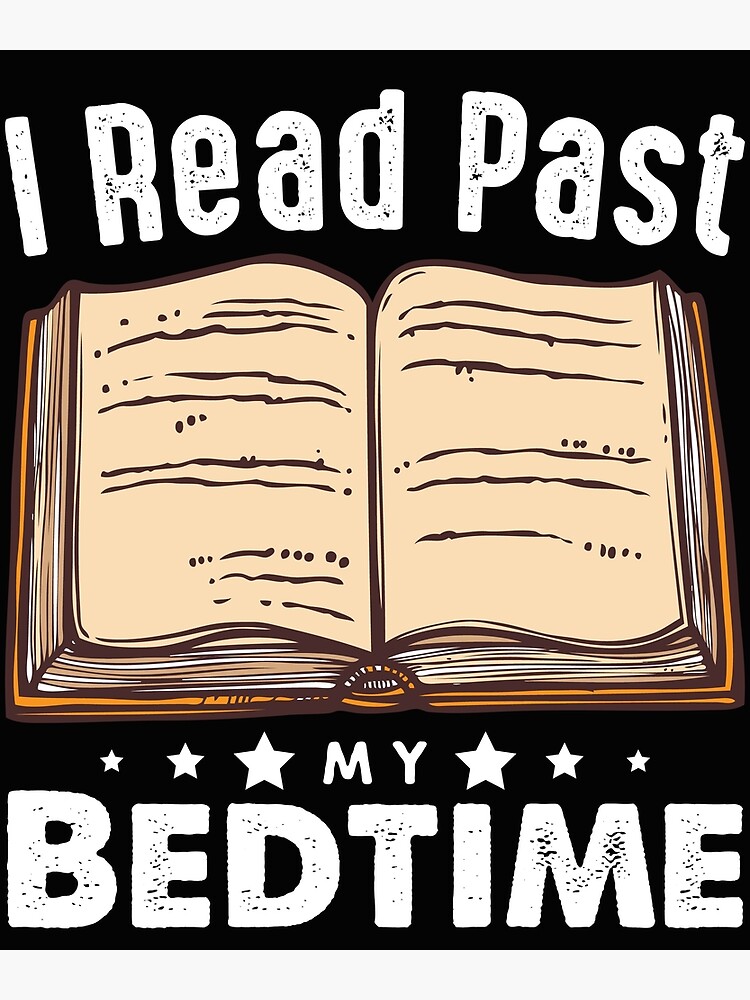 As biblio-therapists, we see each new year as a time to stimulate our future through books, and approach life in a more positive way. Reading can challenge us with more empathy, and change, begin good habits, and calm our minds.
As biblio-therapists, we see each new year as a time to stimulate our future through books, and approach life in a more positive way. Reading can challenge us with more empathy, and change, begin good habits, and calm our minds.
Our January newsletter includes readings to honor Martin Luther King, Jr. Day, small press reviews by Tom Bowden in his column: i arrogantly recommend… a guide to Tove Jansson’s incredible Moomin Fairyland, and a list of books to help you relax and get centered in turbulent times: Calm the Chaos.
Our reading group returns this month with a discussion of Shadows of the Wind, an epic mystery about books and bookstores set in post war Barcelona and written by the Spaniard Carlos Luis Zafón. More information can be found at January reading group selection. If you’re interested in participating, please send us your name and email and we will add you to our contact list. New books are announced at each meeting.
Ancient libraries once protected and kept knowledge away from the masses. “The world’s oldest known library was founded sometime in the 7th century B.C. for the “royal contemplation” of the Assyrian ruler Ashurbanipal.”–History.com Books and literacy in ancient times were accessible only to nobility and the priesthood. Bookstores and libraries have come a long way and (according to Leah Price) a resource for affordable mental health.
We will gladly fill your book prescription anytime during store hours.
Thank you for taking time to read and support books. May we help you?
Best wishes & Happy readings,
Cary, Colleen and the Book Beat staff
![]()
HOURS & ORDERING INFO
We are open for curbside pickup or in store browsing by appointment.
Our hours are: Mon – Sat 10 AM-7 PM, Sun: 12-5 PM, Subscribe to our irregular newsletter.
To place an order directly, or arrange an in store browsing appointment please call us at (248) 968-1190 or email: BookBeatOrders@gmail.com
As an affiliate with Bookshop.org, we appreciate your purchasing through them if unable to buy from us direct. Should Bookshop be out-of-stock of the book you want, please call or write us. Books we list on Bookshop are also stocked at Book Beat, and we’re always happy to try and special order directly from the publisher.
![]()
Take a Russian Lit Master Class with George Saunders
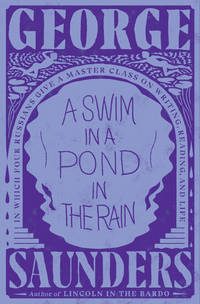 Named one of the year’s “Most Anticipated Reads” by TIME, Harper’s Bazaar, and Oprah Magazine, A Swim in a Pond in the Rain is George Saunders’ latest book. The New York Times bestselling, Booker Prize-winning author guides readers through seven classic Russian short stories (Chekhov, Turgenev, Tolstoy, and Gogol) in a way that’s accessible to all. What’s normally kept private for MFA students at Syracuse University’s creative writing program—where Saunders has taught for the past twenty years—is now available for the world at large, teaching us how to become better readers and writers.
Named one of the year’s “Most Anticipated Reads” by TIME, Harper’s Bazaar, and Oprah Magazine, A Swim in a Pond in the Rain is George Saunders’ latest book. The New York Times bestselling, Booker Prize-winning author guides readers through seven classic Russian short stories (Chekhov, Turgenev, Tolstoy, and Gogol) in a way that’s accessible to all. What’s normally kept private for MFA students at Syracuse University’s creative writing program—where Saunders has taught for the past twenty years—is now available for the world at large, teaching us how to become better readers and writers.
George Saunders on Surprising Himself–a recent interview in The New Yorker
![]()
THE LITTLE BOOK ROOM
We are pleased to see Eleanor Farjeon’s classic 1955 story collection; The Little Bookroom finally made available again in paperback by the NYRB. “The very first Andersen Award was presented to the prolific British writer Eleanor Farjeon, for her extremely bizarre collection The Little Bookroom. This book, illustrated by the peerless Edward Ardizzone, is composed of twenty-seven stories, all somewhat remote in tone, frequently redolent of loneliness, and often carrying a vague air of allegory,” noted Sadie Stein in The Paris Review.
The Horn Book wrote; “They make a rich combination: gems for storytelling and reading aloud, for children’s own reading, and a few that may be appreciated most fully by adults.” Farjeon’s modern fables, stories, and poems coupled with Ardizzone’s “peerless” illustrations will weave magic spells around readers of all ages. The Little Book Room is a keepsake to read, reread and share.
![]()
DETROIT JAZZ HISTORY
Our Friends Jim Gallert and Lars Bjorn (local educators, jazz archeologists, and authors of Detroit jazz Before Motown: A History of Jazz in Detroit, 1920-60 . They have both created a new research blog: Detroit Jazz History. The site is dedicated to the history and stories of some of the great Detroit jazz musicians.
![]()
The School of Life 101
The School of Life is a publisher of physical books and an online blog/educational service. Beside their headquarters in London, they have physical locations in London Antwerp, Amsterdam, Berlin, Istanbul, Mexico City, Paris and São Paulo, Seoul, Taipei and Tel Aviv. The company was founded by philosopher Alain de Botton in 2008.
Their mission is explained as “An organisation built to help us find calm, self-understanding, resilience and connection – especially during troubled times. We place emphasis on the need to understand ourselves better, so that we can secure serenity and make optimally reliable decisions, particularly around love and work.”
Access the School of Life’s YOUTUBE CHANNEL to learn more.
![]()
THIS MONTH’S #1 INDIE NEXT LIST PICK AUTHOR INTERVIEW
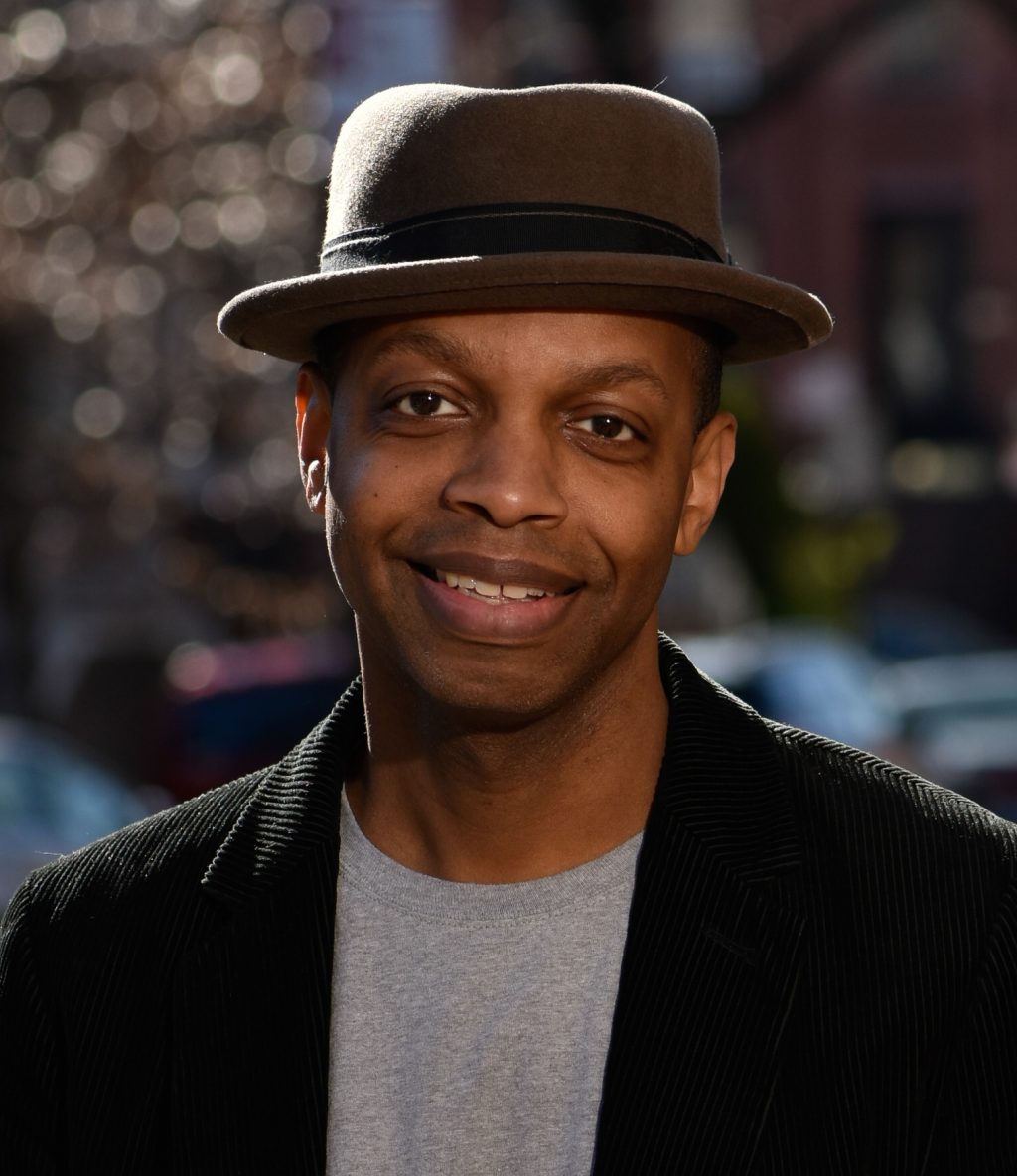
Credit: Alberto Vargas RainRiver Images
Independent booksellers across the country have chosenThe Prophets (G.P. Putnam’s Sons) as their top pick for the January 2021 Indie Next List. The Prophets explores the forbidden union between Isaiah and Samuel, two men on a Deep South plantation, and the betrayal that threatens their existence.
Jones was born and raised in New York City. He received his BFA in creative writing with honors and MFA in fiction from Brooklyn College. He has written for numerous publications, including The New York Times, The Paris Review, Essence, OkayAfrica, The Feminist Wire, and The Grio. He is the creator of the social justice community Son of Baldwin, and was recently featured in T Magazine‘s cover story “Black Male Writers of Our Time.” The Prophets is his debut novel.
Where did the idea for this story come from?
I had always wanted to write a story with Black queer characters at the center of it and had even written a short story or two as a teenager. But I never thought I would write about Black queer love during the antebellum slavery period until I was given an assignment during my first year of graduate studies. I had to find material objects that a character in a story or novel I was thinking about writing would possess. I found a pair of shackles(!) on the street near a pile of garbage bags and knew immediately that the character floating around in my head (who would eventually become Samuel) was enslaved and I would have the task of writing something that I had never read before, which was terrifying because there was no template. However, Toni Morrison’s words provided inspiration: “If there’s a book that you want to read but it hasn’t been written yet, then you must write it.”
This story centers on the relationship between two enslaved young men on a Deep South plantation, Samuel and Isaiah. How did you craft their characters?
I spent a great deal of time thinking very deeply about what it meant to be Black during slavery. One of the things I came to understand was that despite the horrors inflicted upon my ancestors, it was never their humanity that was up for debate. What was truly debatable, if not outright abandoned, was the humanity of the enslavers. I had to then imagine how what we now call queerness would have affected the already gruesome status quo; how the enslavers and the other enslaved people might have reacted to yet another identity that would marginalize the already marginalized. Kimberlé Crenshaw’s concept of intersectionality was extremely helpful here. Once I internalized that idea, it was just a matter of visualizing Samuel and Isaiah (by looking through the remaining 19th century photographs and art depicting enslaved Black people) and then listening very carefully to hear the whispers and watching very closely to see the signs, not dismissing either as fanciful flights, wild imagination, or coincidence, until I could get their voices and perspectives–and, most importantly, their love–down on the page as best I could.
Why center the story on them?
For my undergraduate degree, I majored in creative writing and minored in Africana studies. I had read tons of literary works and yet could find none where the Black queer love was front and center, or present in the cultural or historical landscape prior to the Harlem Renaissance of the 20th century. Where I did find references, it was only in the context of sexual assault or some other form of depravity. And my question was: What about love? I knew early on that the writing that would eventually become The Prophets would be an answer to that question, which meant that Samuel and Isaiah had to be the beating hearts of the story.
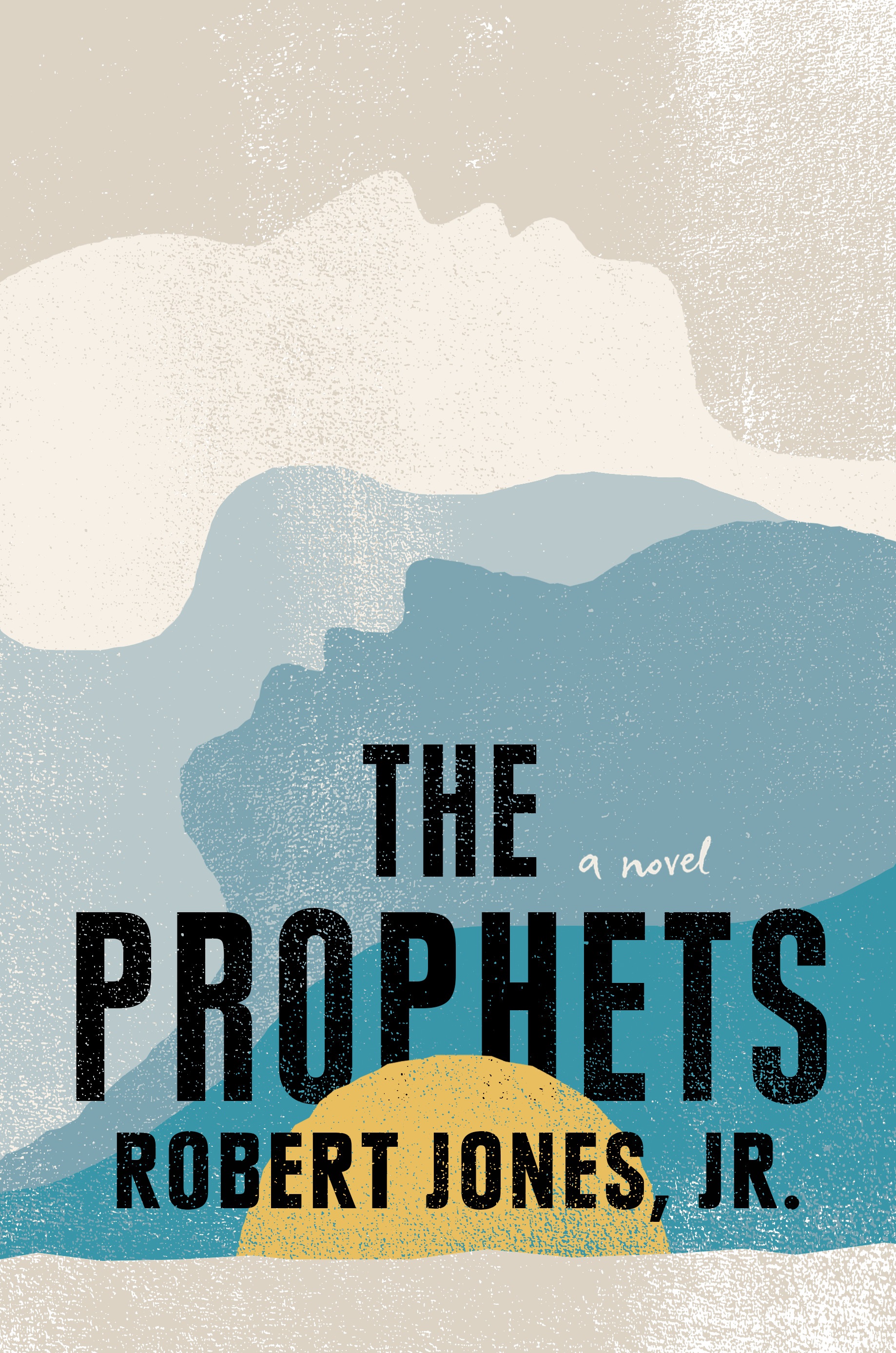 Can you talk about the process of writing this book? And what was your research process like?
Can you talk about the process of writing this book? And what was your research process like?
I started thinking about the writing that would eventually become The Prophets during my final year of undergrad, but didn’t actually put pen to paper until my first year of grad. My writing was sporadic because I was working two part-time jobs and attending grad school full-time. I had to write whenever and wherever I had the time, which was generally on public transportation during my commutes to and from school and work, at the witching hour when I had the strength to wake myself up, on my breaks at work (and sometimes during work to be honest). I wrote on whatever scraps of paper were handy to me at the time: receipts, paper bags, loose-leaf paper. I just had to make sure to write down the thoughts as they came to me so I wouldn’t lose them.
In terms of research, I read just about every slave narrative I could get my hands on. I read works on race theory and Black queer theory. I read fictional works that dealt with slavery or queerness. I read works by sociologists who researched the impact certain colonial religions had on expressions of queerness in colonized societies. Most importantly, I listened to oral histories that gave the clearest picture of how Black queerness existed in the African landscape prior to European interference. Thankfully, most of this research was already assigned to fulfill my obligations as an Africana studies minor, and so the scholarship was very accessible.
This book features a number of different perspectives. What made you decide to incorporate so many voices for this particular story? How did you tap into them?
I was initially going to tell this entire story from the point of view of either Isaiah or Samuel. Each time I set out to do so, I felt like something was lost, incomplete. What I realized was that Samuel and Isaiah needed witnesses for their testimony, witnesses to both absolve and indict, to testify and to lie. That meant I needed to let other characters have their say. I found Morrison’s Paradise and Ayana Mathis’s Twelve Tribes of Hattie very helpful in this sense, as the structures of those books helped me to imagine how I might be able to let each character speak their piece in The Prophets.
I did a lot of meditation to hear the voices of each of the characters. I also drew on my personal family history, recalling summers spent Down South and my Southern family elders, remembering how they spoke, walked, laughed, cooked, danced, and worshipped.
One theme in this book is of generational trauma and its impact. What drew you to this idea?
Oddly enough, it was not a conscious decision to write about generational trauma. That seems to be inherent in the subject I chose to write about because where there is oppression and violence, there is trauma. And untreated trauma is bound to be passed down through the generations until it is addressed and healed. What became fascinating to me, though, is how the vast majority of us have chosen to deal with our traumas in the absence of a medical, political, social or moral imperative to take healing them seriously. What I found surprising was that for many people, trauma doesn’t inspire sympathy or compassion for other people’s suffering, but rather many people feel their traumas give them permission to cause other people suffering, but call it by some other, less implicating, absolving name which allows them to maintain their “innocence,” thus their moral authority. The ability of human beings to rightfully fight against being oppressed while wrongfully oppressing other human beings is as fascinating as it is frightening. The Declaration of Independence side-by-side with antebellum slavery is one of the most acute examples of this cognitive dissonance; how marginalized cisgender people treat transgender people is another.
Biblical references are featured throughout the narrative. Can you talk more about why you incorporated them?
I grew up with at least one foot in the Christian church. Even when I did not attend church (and I didn’t attend often), the influence of Christian doctrine played a huge role in how I was shaped. Whether it was corporal punishment, toxic masculinity, misogyny, or anti-LGBTQIA+ bigotry, these things were introduced to be by Christianity. I learned not just to hate others, but to also hate myself–and to believe all of that hatred was actually “love” as dictated by the figures of Jehovah and Jesus Christ. As I started writing The Prophets, it became clear–because of my upbringing, because of what I had learned through my research–that there was no way I could write about anti-Blackness, anti-queerness, and antebellum slavery without confronting Christianity’s significant role in all three. To this very day, Christianity holds itself up as the chief moral arbitrator while low-key, if not high-key, regarding Black people, Brown people, women in general, poor people, LGBTQIA+ people, and disabled people as somehow inferior and unworthy — unless we can be more in line with and supportive of white supremacist capitalist patriarchy. Despite the concrete denial of this reality, I wanted to explore it and see where it would take me.
Is there any one thing you’d hope readers take away from this book?
What I most hope readers take away from this book is that we should make conscious efforts to do less harm to one another. There is only so much a human being can take in terms of oppression before they become justified in whatever their response to that persecution is. And wouldn’t we prefer cooperation to catastrophe? I used to think the answer to that question was obvious and simple until almost 74 million people in the United States boldly voted for the latter. I hope this book can, in whatever small and insignificant ways, chip away at that number.
What is the role of indie bookstores in your life?
RJ: I love booksellers! I actually used to work at the Scholastic Bookstore so I understand how challenging, how underappreciated, and how rewarding the work of booksellers is. Indie bookstores are where my love for comic books (and thus my love for storytelling) was nurtured. Like libraries, indie bookstores serve a crucial role in the distribution of collective knowledge in the communities they serve. These sites become meeting places where one can listen to and engage writers and thinkers. The pandemic has unfortunately altered this, but I’m so happy that many of the independents have transitioned to virtual spaces and continue these necessary conversations and interactions. I have a particular and special love for the Black-owned indie bookstores, where works by Black artists are showcased in ways that push back against mainstream marginalization or minimization. It was at a Black-owned bookstore that I discovered Terry McMillan and James Earl Hardy, which led me to Toni Morrison and James Baldwin. I’m forever grateful.
Do you have anything to add?
Please be kind to yourself and others. Tell a struggling writer not to give up because what they are working on is a necessary intervention and a blessing for the world. Reading helps develop empathy; read more. Support independent bookstores.
![]()
Hope
Smiles from the threshold of the year to come,
Whispering ‘it will be happier’…
–Alfred Lord Tennyson

